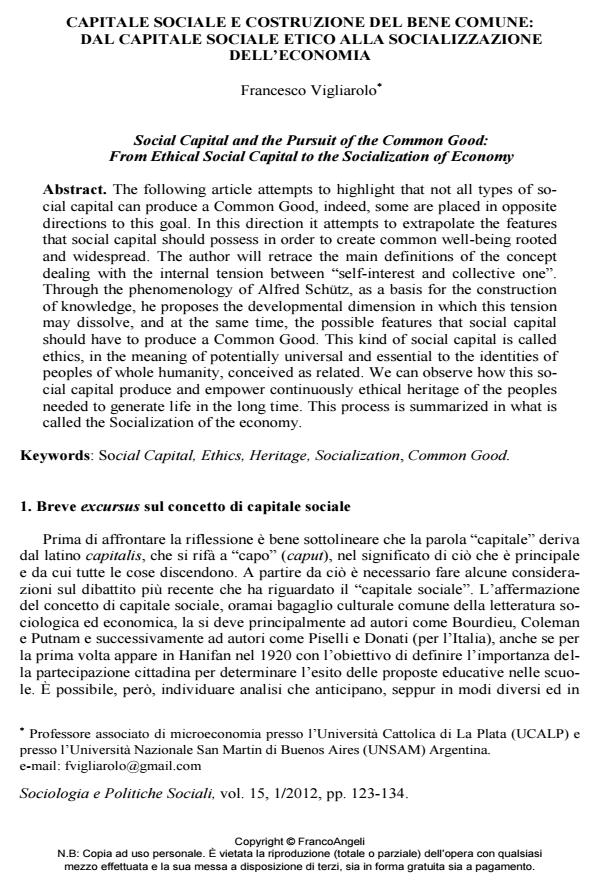Social Capital and the Pursuit of the Common Good: From Ethical Social Capital to the Socialization of Economy
Journal title SOCIOLOGIA E POLITICHE SOCIALI
Author/s Francesco Vigliarolo
Publishing Year 2012 Issue 2012/1
Language Italian Pages 12 P. 123-134 File size 299 KB
DOI 10.3280/SP2012-001007
DOI is like a bar code for intellectual property: to have more infomation
click here
Below, you can see the article first page
If you want to buy this article in PDF format, you can do it, following the instructions to buy download credits

FrancoAngeli is member of Publishers International Linking Association, Inc (PILA), a not-for-profit association which run the CrossRef service enabling links to and from online scholarly content.
The following article attempts to highlight that not all types of social capital can produce a Common Good, indeed, some are placed in opposite directions to this goal. In this direction it attempts to extrapolate the features that social capital should possess in order to create common well-being rooted and widespread. The author will retrace the main definitions of the concept dealing with the internal tension between "self-interest and collective one". Through the phenomenology of Alfred Schütz, as a basis for the construction of knowledge, he proposes the developmental dimension in which this tension may dissolve, and at the same time, the possible features that social capital should have to produce a Common Good. This kind of social capital is called ethics, in the meaning of potentially universal and essential to the identities of peoples of whole humanity, conceived as related. We can observe how this social capital produce and empower continuously ethical heritage of the peoples needed to generate life in the long time. This process is summarized in what is called the Socialization of the economy.
Keywords: Social Capital, Ethics, Heritage, Socialization, Common Good.
- Economic Systems and Human Rights Francesco Vigliarolo, pp.353 (ISBN:978-3-031-72865-5)
- Innovations for Circularity and Knowledge Creation Francesco Vigliarolo, pp.123 (ISBN:978-3-031-59522-6)
- From financialization to economic socialization: the meso-economy and the ethic social capital concepts to change the social order in modern democracies Francesco Vigliarolo, in Review of Evolutionary Political Economy /2022 pp.227
DOI: 10.1007/s43253-022-00068-5
Francesco Vigliarolo, Capitale sociale e costruzione del bene comune: dal capitale sociale etico alla socializzazione dell’economia in "SOCIOLOGIA E POLITICHE SOCIALI" 1/2012, pp 123-134, DOI: 10.3280/SP2012-001007